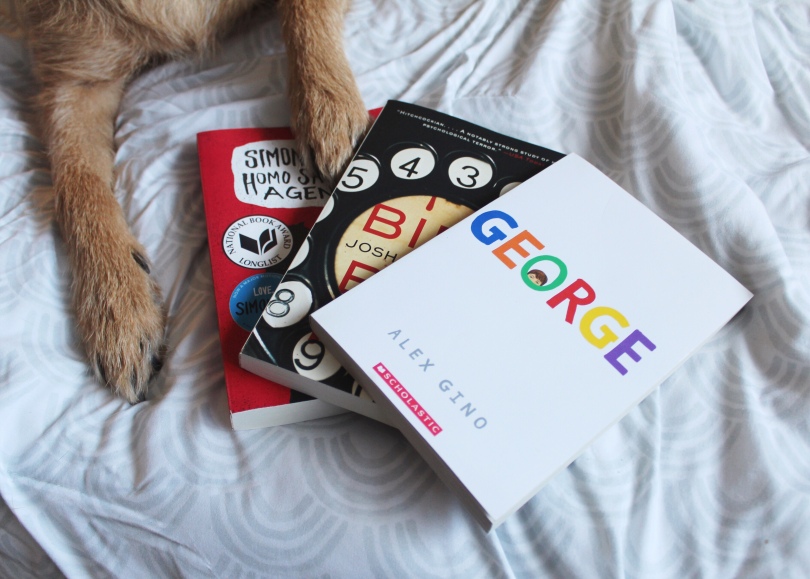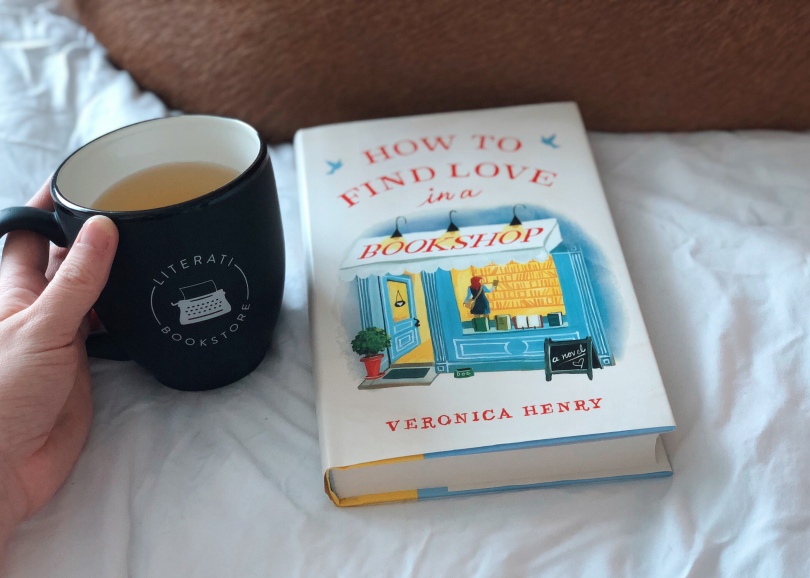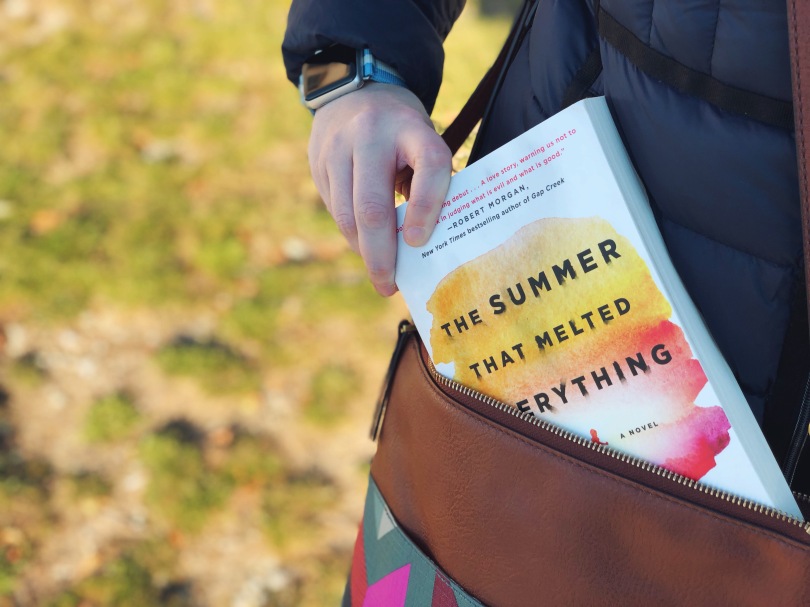After reading The Summer that Melted Everything, I had the pleasure of interviewing the author, Tiffany McDaniel. McDaniel was such a pleasure to talk to and I really enjoyed learning more about her through these questions.
What is the first book that made you cry?
I was introduced early to books through my mother who instilled in us the importance of reading and who read to us every night, so the first book that made me cry was probably a book I read when I was a kid and that’d be Donkey, Donkey by Roger Duvoisin. It’s about a donkey who is sad about his ears. He doesn’t feel they are beautiful like the other animals and their ears on the farm. There is an illustration in the book where the donkey gets his ear cut on a farm tool. The illustration of the blood and of the subsequent pain on the donkey’s face was shocking to me as a kid and I still remember the feeling of sadness that cut through me.
What was one of the most surprising things you learned in creating your books?
The most surprising thing is learning about the industry of publishing itself. While The Summer that Melted Everything is my first published novel, it’s actually my fifth or sixth novel written. I wrote my first novel when I was eighteen, and wouldn’t get a publishing contract until I was twenty-nine for TSTME. It was a long eleven-year journey to publication, full of lots of rejection and heartbreak. I was often told I wasn’t publishable in today’s commercial marketplace, but I never gave up. Another surprise was to learn how slowly traditional publishing moves in today’s fast-paced world. Even after TSTME was on contract, it was over a two-year wait to see the book on the shelf as two years is the average time it takes to move a debut novel through a publishing house. So all told it was close to fourteen years before I got the chance to see one of my novels on the shelf. Starting out as an eighteen-year-old novelist seeking publication, I had no idea of the struggle and the years that lay ahead.
What’s the most difficult thing about writing characters from the opposite sex?
As authors we need to be able to craft characters of every gender, race, religion, and age. Prior to writing a novel, I don’t write character sketches or outline, so for me the story evolves with each new word and page I write. Perhaps this is the reason why I don’t find a challenge in writing characters who are not like myself. I’m in the head of the character and so focused on delivering the truth of the character to the page, that I don’t stop to think about the differences between myself and the character I’m writing because at that moment the only voice I am hearing is that of the character’s.
Do you read your book reviews? How do you deal with bad or good ones?
Going into having a book published, I didn’t realize how much of the marketing and publicity falls on the author’s shoulders. I started the marketing outreach about four months prior to the hardcover’s July 2016 release, and have continued the marketing since then, whether it be reaching out to book bloggers, offering interviews such as this, Skyping with book clubs, and attending the book fairs and festivals. Part of having that working relationship with bloggers and reviewers is that you read the review when it comes in. Sometimes the review is great, sometimes it’s the opposite. Having the rejections I’ve had and the struggle to get published has made it so I struggle to feel deserving of a good review. On the flip-side of that, it’s never easy to receive a bad review, especially in today’s world in which we’re often reviewed on a 24/7 cycle with the internet and that level of criticism can erode a person’s spirit. In addition to the emotional reaction to a review, a review has the power to turn readers on or off of a novel, which in turn affects not just sales of a book, but an author’s very career. Reviews are powerful things. You can get a million good reviews, but it’s always the bad reviews that you remember, oftentimes, line for line.
Where did you get your inspiration for the Bliss family?
When I write a novel, the characters always feel like real people to me. So much so, that if there is anything after this life, I feel as though my characters will be among those I meet on the other side. I have written novels in which characters are inspired by real people. Such as the first novel I wrote which was based on my mother’s life coming-of-age in southern Ohio and the sexism and racism she faced growing up. But in the case of the Bliss family, it was the Bliss family members themselves who inspired me to write them. The father, the mother, the sons, it’s all through listening to them with the goal of writing their truths to the best of my ability, that they came to life on the page. It is their love and connection as a family that makes them so special. For many of us, they are the “bliss” of the family unit we all crave.
No spoilers, but what was your hardest scene to write in this novel?
The hardest scene was Sal’s scene toward the end of the novel. I can’t say any more than that without giving anything away. But I will say Sal was such a wonderful character to write. He’s so creative and intelligent. He’s also a contradiction being an old soul in a young body. That type of character is always a pleasure to spend time with.
The names of the characters in this book are so fun and interesting, how did you select them? Specifically Autopsy’s.
With names I try to add a subtle meaning to the characters. In the case of Autopsy’s name, I had seen the word “autopsy” the day I was writing his character. I was familiar with the word and its meaning of the dead body on the cold slab about to be cut open and examined. Then I dug a little further to the word’s Latin roots which mean “to see for oneself”. I thought it the perfect name for a man who one day invites the devil to town. My hope with his name is that as readers continue to repeat the name Autopsy throughout the course of reading the novel that they began to see older Fielding, getting up on the cold slab, and cutting himself open, trying to figure out what has killed him and his spirit. In essence the whole book can be seen as one big autopsy Fielding is performing on himself.
There are some characters I can’t reveal the meaning behind their names without giving something away, but I’ll say Dresden was named so because here in Ohio there is a small town called Dresden that I have fond memories of, but she was also named Dresden for dresden porcelain, which is fragile and easily broken, in many ways a representation of her character.
Fielding is named so because when I thought of him, I thought of a field and its two possibilities. On one end, a field can be a nurturing place, a land of fertile possibilities in which great things can grow. On the other side of things, a field can become barren, unable to grow again. Fielding experiences both sides of a field as he comes-of-age.
As for Elohim, Elohim means God in the Hebrew bible. So we have the one who is called “god” in Elohim and the one who is called “devil” in Sal, only it’s about taking these two ideas and turning them on their heads, emphasizing that we should look beyond what people are called to understand them and to see for ourselves who they truly are.
What kind of research do you do, and how long do you spend researching before beginning The Summer that Melted Everything?
For this novel, the research centered on learning more of the cultural identity of the 1980s as well as the emergence of AIDS and how the disease was shaping the nation as a whole. I didn’t want to weigh the story down with too many facts from the 80s because I always want my books to feel timeless, as if they could have taken place in any decade because even though our fashions, music, and hairstyles will change, there are some things about being human that will never change. We will always love and we will always hate. There’s no research involved with understanding and writing that part of the story, because as humans, these emotions are what we experience throughout the course of our personal and societal evolution.
Did you pull from personal experience when writing The Summer that Melted Everything?
The town in the novel, Breathed, Ohio, is a fictional town based on a real town in the southeastern portion of Ohio, where I’d spend my childhood summers and school-year weekends on the farm my father was left by his parents. It was from my memories and experiences of coming-of-age there in those hills that I pulled from as I wrote of Breathed. In all the novels I have written thus far, Breathed, Ohio has been in all of them. That southern Ohio landscape and culture has shaped me as an author.
How did you decide to write this from an older Fielding’s perspective?
I wanted to explore not just that summer of 1984, but the ripple effects of that summer that carried throughout the rest of Fielding’s life. Melting is such an important theme in the novel, because once something is melted, it can never be put back together again. Melting changes the very chemistry of something and of someone. I wanted to explore this with Fielding in an attempt to show that something that happens in our life can have lasting effects.
What’s your favorite under-appreciated novel?
Perhaps Shirley Jackson’s We Have Always Lived in the Castle. It’s a beautiful story about two sisters who are living in their dilapidated family mansion. Together, the sisters try to come to terms with who poisoned the rest of their family. Jackson has a wonderful delivery that makes her an author more people should read.
I usually end up needing a break from my work throughout the day, how do you de-stress from the writing process?
Art is a wonderful way to de-stress for me. I enjoy painting and drawing. It’s that fluidity of the movements that I find therapeutic. I love plants, so gardening is something that energizes me, especially given writing is a process in which one is constantly staring at a computer screen. It’s nice to step away from technology and really focus one’s eyes back out on the world around us. I also enjoy baking, crocheting, and spending time with all the animals in my life.
What books have most influenced your life?
One of the books that had an effect on me as a child, an effect I have never forgotten, is Barbara Cooney’s Miss Rumphius. It was the first book I remember reading as a child that had a main character who was female. She lived life on her own terms, without male involvement, whether good or bad. By the end of the novel, she had changed the world through something so seemingly simple, and yet so powerful. As a girl coming-of-age, it was important to read a book that celebrated a woman’s independence.
A good villain (or devil in this case) is hard to write. How did you get in touch with your inner villain to write this book. Was there a real-life inspiration for him/her/it?
I knew going into this that I didn’t want to write the stereotypical devil, the one of red flesh and horns that has almost become cartoonish in our society with his fire breathing manners and pitchfork ready to stab us. I wanted to explore the good and evil within the human spirit. So while there was no certain real-life inspiration for the villain in this story, I think it’s a villain that we recognize in its human form. Without giving too much away, I will say that the villain of the story is not who readers may think going into the novel.
If you had to go back and do it all over, is there any aspect of your novel or getting it published that you would change?
There’s nothing about the story that I would change. It’s a novel that upon completing it, I knew I had laid down the truths of the characters and there is a sense of peace in that. As far as getting it published, so much of publishing is out of the author’s hands that even if there are things I would change, I wouldn’t be able to. One of those things would certainly be the time it takes to publish a book, though.
Do you have any future projects we should be on the lookout for?
I have eight completed novels, as well as a completed compilation of poetry. I thought with a novel already published, it’d be easier to get a second book published, but the two novels I’ve pitched to editors since TSTME’s release has been rejected with editors citing the riskiness of my storytelling, which is something I think female authors hear more than their male counterparts, especially in the literary fiction genre. In addition to that, editors go by the sales of a book, and if a debut undersells, that can make it a struggle to get published again. While it’s up to the publishers if I get published again, I’ll not give up, which is something all us authors must never do.
Is there anything else you would like to add that I haven’t included?
While I don’t have social media, readers can always reach me direct through my website where I personally answer every email sent to me. As authors we must never forget to value our readers and to make sure they feel appreciated because without readers, and their support and championing of a novel, we authors do not have a career.









